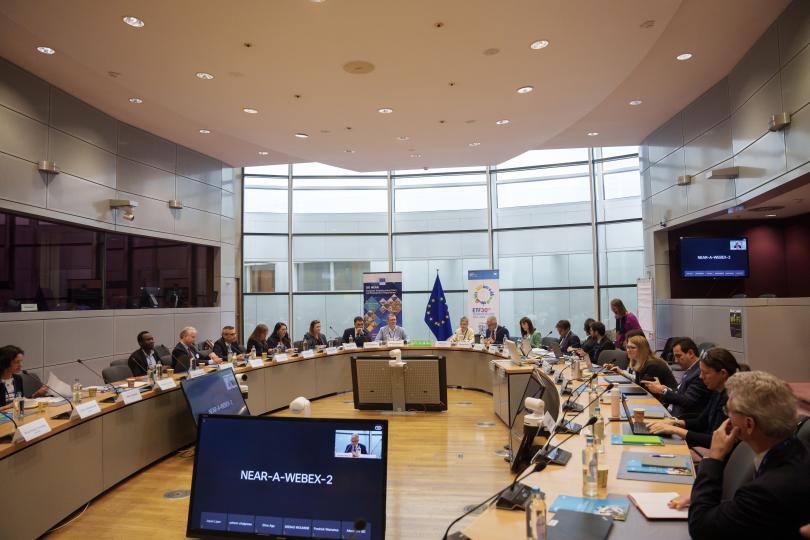
Investing together to address the global skills gap
More systematic collaboration among international financial institutions (IFIs), the European Commission, and the European Training Foundation (ETF) is essential for tackling the global skills mismatch and promoting sustainable development. This key message emerged from a high-level event in Brussels yesterday, where representatives gathered to build on the European Year of Skills and to launch a new publication: Is money the solution? International financial institutions investing in the future of skills.
Participants agreed on several important themes: promoting unity and collaboration in investments for skills development, and recognising the publication as a significant step towards concrete cooperation. They also emphasised the importance of advocacy, capacity building and policy advice, while maintaining a committed, ambitious mindset, summarised by the motto: "Where there’s a will, there’s a way." The discussions also focused on identifying the right opportunities and key individuals to drive advocacy, showcase best practice, and design effective incentives.
Collaborating for a long-term impact
Representatives of the ETF, the European Commission’s Directorate-Generals for European Neighbourhood and Enlargement Negotiations (DG NEAR), for Employment, Social Affairs and Inclusion, and for International Partnerships – along with members of the European Investment Bank, the European Bank for Reconstruction and Development, the Asian Development Bank, the African Development Bank, the World Bank, and the Association of Bilateral European Development Finance Institutions – came together to tackle the global skills gap and promote sustainable development.
This collaboration highlighted the power of transformative partnerships in creating long-term benefits from investments in human capital.
"Together, we can transform our investments into sustainable and meaningful change," said Pilvi Torsti, ETF Director, during her opening speech.
She stressed the importance of bringing together key players, adding that:
“The publication we are launching today demonstrates our commitment to unity for long-lasting impact.”
Addressing the skills deficit
Mathieu Bousquet, Director for Thematic Support, Coordination of Policy and Financial Instruments in DG NEAR, highlighted the significant challenge of skills mismatches, a systemic challenge underscored by the latest PISA results showing that many 15-year-olds struggle with basic literacy and numeracy. This educational shortfall directly affects key productive sectors, making it difficult to find a sufficiently skilled workforce, hindering growth and progress.
Bousquet emphasised the EU’s commitment to addressing this issue, noting that between 2021 and 2023, DG NEAR adopted 26 actions with a specific budget for education activities amounting to EUR 900 million, in addition to EUR 1 billion for Erasmus+.
"If we want to achieve sustainable development in EU partner countries, skills are essential to any investment," he stated, stressing the need for "radical collaboration" to turn these investments into tangible outcomes.
Bousquet also highlighted the European Fund for Sustainable Development Plus, which offers EUR 40 billion in guarantees until 2027 as well as grants that can be blended with loans, as important tools that can support the development of sustainable skills in partner countries.
Understanding the skills landscape, developing strategies
The ETF's Donatella Di Vozzo painted a picture of the current skills landscape, emphasising the urgency of investing in skills development. She pointed to alarming statistics, such as 40% of young people not having the skills for the jobs they should perform. Reflecting on the future of work, Di Vozzo noted that since 2018, the ETF has used innovative methods like text mining to study six sectors across eight countries.
“We’ve found some striking facts, such as shared skills demand within sectors, and the significance of soft skills,” she explained. "There is no room for solo performances," she concluded, stressing the need for collaborative efforts.
In a panel discussion led by the ETF’s Manuela Prina and DG NEAR’s Hoa-Binh Adjemian, representatives from all the IFIs present shared insights on integrating skills development into their investment strategies. They focused on practical steps to enhance collaboration and effectiveness.
Looking ahead: sustained commitment and advocacy
The event concluded with a call to maintain high levels of commitment and ambition in the field of skills development. DG NEAR’s Lukas Vesely pointed out the necessity of developing practical examples and designing investment projects where the skills dimension is fully integrated, and ongoing advocacy with the corresponding partners to make these projects a reality.
"We have to work together to ensure that skills development is not neglected in the EU enlargement and neighbouring regions," he said.
The ETF’s Georgios Zisimos echoed this, highlighting the need for radical collaboration and capacity building.
"We all need to get out of our comfort zone," he urged.
In her closing remarks, Torsti emphasised two key principles for making the meeting truly impactful: recognising that collaboration isn’t always straightforward and pinpointing the right moments and individuals for action.
“Through advocacy, showcasing best practice and providing incentives, we can effectively drive change,” she concluded.
Did you like this article? If you would like to be notified when new content like this is published, subscribe to receive our email alerts.